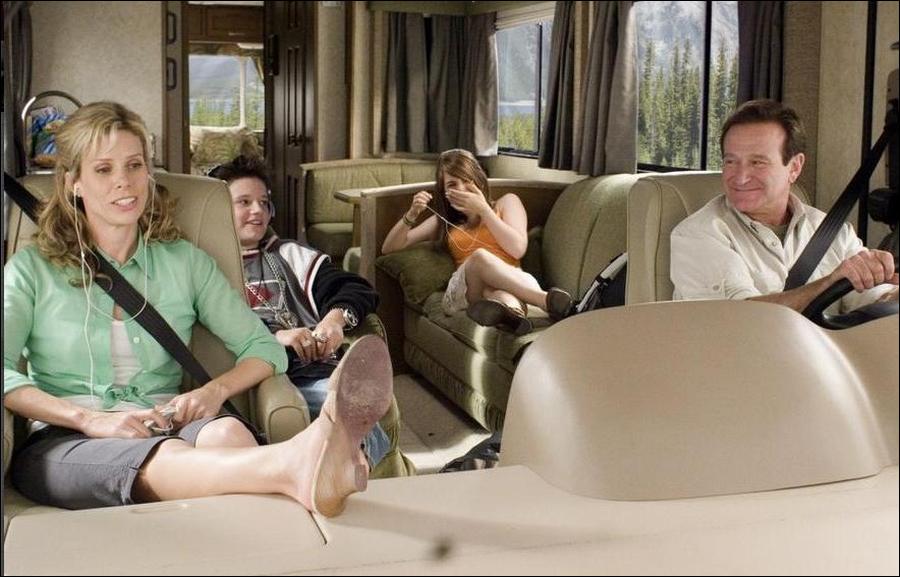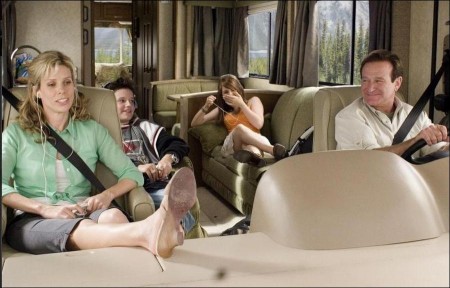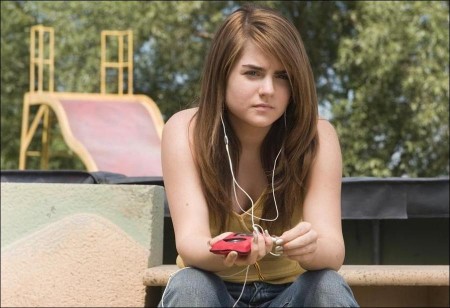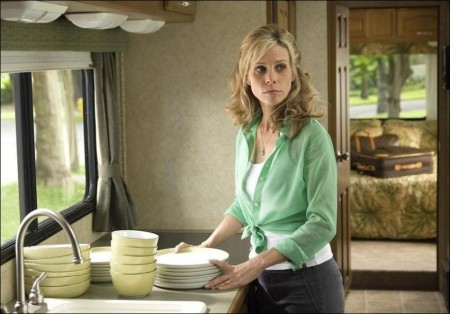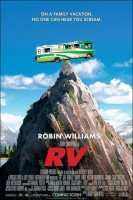Tagline: On a family vacation, no one can hear you scream.
In Columbia Pictures’ family adventure-comedy RV an overworked executive, Bob Munro (Robin Williams), persuades his wife and children to give up their Hawaiian vacation for some “family bonding” on a cross-country RV trip. But it’s all a ruse. Bob has other, more career-oriented reasons on his mind than spending quality time with his family in the Rocky Mountains. Through a series of misadventures, including constant run-ins with an overly friendly troupe of full-time RV’ers, Bob inadvertently learns the true meaning of family.
The American Dream on Wheels
The story follows a man (Robin Williams) and his dysfunctional family when they rent an RV and head for the Rockies, ending up in a campground community.
About an average, dysfunctional American family who is about to set off on the most dangerous, high-stakes, life-threatening and traumatizing adventure of their lives: two weeks together in an RV. “For a day, for a lifetime” is the tantalizing advertising logo that inspires a man to take his family on the adventure of their lives by assuming the helm of a deluxe recreational vehicle and winding through the back roads of the good old U.S.A. A vehicle with more personal amenities than a 747 jetliner, this RV is the American dream come true.
At least that’s the case a desperate Bob Munro (Robin Williams) makes to his family when he announces a change of plans for their long overdue vacation. The real reason is that his boss at Pure Vibe soda has made it clear, in no uncertain terms, that either he closes a merger acquisition over the coming week (his vacation week) or not bother returning from vacation at all.
To his family’s horror, their dreams of lounging on the beaches of Hawaii are dashed as they are forced to board a giant, unmanageable RV for a trip to the Rocky Mountains, and not since Stripes has a recreational vehicle featured so prominently in a major motion picture comedy.
The genesis of the project was a real-life RV family vacation taken by the film’s producers, Lucy Fisher and Douglas Wick, several years back. The husband and wife team had three very young children at the time and they were looking for a family-togetherness outing. “Doug is a very good vacation planner,” says Fisher, “and we decided to take an RV trip. We didn’t really know much about it, but Doug loves to drive things and I like puttering around in the back, so it seemed like a fun idea. We spent a long time researching it — where we were going to get the RV, where we were going to go, etc.”
In the end, they were joined by a group of friends and their respective families, forming a caravan of recreational vehicles, cruising along the highways and byways and communicating via walkie-talkies. What started out as a “trucker fantasy,” according to Wick, became a wellspring for a comedy about families.
“RV life is pretty funny because suddenly your whole family is cramped into more or less one room for however long the trip is,” Wick laughs, “and you get to know each other in a whole different way.”
For the film’s director, Barry Sonnenfeld, even the look of an RV makes him laugh. “RVs are funny for many reasons,” says Sonnenfeld. “First of all they look funny. They’re too tall. They’re too long, they’re sort of ungainly and, inside, they are sort of weirdly full of off-versions of otherwise perfectly good colors.”
And, as producer Wick learned, “anything that can go wrong with an RV often does.” Each member of his caravan suffered a setback with either the electricity, the plumbing or under the hood. “There’s a big learning curve when you join the RV world.”
The real story of RV, however, is the typical American family the vehicle is transporting. “What was interesting about this project is that it gave me the opportunity to explore the nature of families,” Sonnenfeld continues, “and how, as you get older and your kids get older, they make their own friends and begin to grow away from you.”
Sonnenfeld could also not resist the idea of mining the comic potential in what could easily be a horror story. “My theory has always been the worse the experience, the better it is when you describe it in retrospect. I passed four kidney stones. Each one was horrible, but those stories are some of my best and funniest stories. Getting a flat tire on the Long Island Expressway on Thanksgiving – that’s a good story, but again, in retrospect.
RV is about a family that has sort of drifted apart — even though they all still live together. They’ve all got their own MP3 players, their own computers. So even when they’re in the same room, they’re apart mentally. Forcing them to be together in this recreational vehicle at first threatens to make them grow even farther apart, but their near-disastrous experiences bring them back together in a hilarious fashion. It’s through adventure and adversity that they are forced to do things together as a family again and to reconnect.”
Also, Sonnenfeld adds, the Munros’ shared experiences are what comes to define them as a family. “When you’re all driving together and you get a flat tire, and you’re all standing on the side of the road in the rain laughing because there’s no jack and dad is using his Tool Man screwdriver to try and change the tire – that’s something you remember for the rest of your life.”
For the producers, RV is also a movie about community. “As soon as we arrived in the first RV camp, we saw there was a community of people that were having a really good time,” Fisher recalls. “They had blenders and were making margaritas and having parties. We really sensed that the communal life at the RV camp was one of the major draws.”
The experience proved so indelible for Fisher and Wick that they immediately began contemplating a movie that would explore the RV lifestyle. “The idea,” says Wick, “was to take a family with all kinds of issues and problems and let them be worked out within the intimate confines of an RV trip.”
For director Sonnenfeld, the film was a way of creating a story that also reflected his own experiences as a father and husband. He saw RV as a way to incorporate some of his own amusing (again, in retrospect) experiences into a motion picture comedy.
The Munros and the Gornickes
After screenwriter Geoff Rodkey (Daddy Day Care) delivered his script about a man who has trouble juggling his personal and professional life, the producers sought out the ideal actor to play the central role of Bob Munro — the ideal being Robin Williams. “He’s the first person we thought of,” says Fisher, “because we wanted someone you believe would take his family on an RV trip and would, at the same time, be completely ill-equipped to do all the mechanical handyman work required. And we were so happy when Robin said yes, because he has heart and he’s one of the world’s most brilliant comic actors.”
To shepherd Williams through the comic zigs and zags of RV, Fisher and Wick also aimed high, setting their sights on the man who directed such major comedy hits as The Addams Family and Men in Black™ films as well as Get Shorty. “We really wanted a director who was funny and who could bring an original touch to the movie,” says Fisher. I had worked with Barry on Men in Black. He’s incredibly talented and really funny.”
“Barry is one of the funniest people you will ever be in a room with,” adds Wick, “and he also has exquisite visual taste, having originally been a cinematographer for the Coen brothers, among others. So I knew he would bring a theatricality that you don’t often get in these kinds of family movies.”
While Wick saw Williams’ character as his own alter ego, Sonnenfeld also strongly identified with Bob Munro. “Robin is essentially playing me,” Sonnenfeld confesses. “I’m not sure he was even aware of it, but every time Bob was scared or ran out of the RV screaming because of a raccoon, or wanted to be the first guy in the meal line, he was playing me — a sort of self-centered Jewish guy, even though the character in the movie is in no way Jewish. “
While Williams may not have been aware of how closely Bob Munro’s character mirrored that of his director, he says he certainly got an inkling when Sonnenfeld described the Munros’ disaster-prone journey as a “gefilte-fish-out-of-water kind of family” story.
“To this day, I have personally never driven an RV,” says Sonnenfeld. “In fact, I never even drove one of the RVs in this movie around the parking lot. I think the largest vehicle I ever drove was maybe my 1962 Lincoln convertible.” Williams, on the other hand, was required to get behind the wheel of an RV on a daily basis throughout production. “Yeah, I drove it,” Williams says with a roll of the eyes, “starting with the training sessions, which I needed because the RV is so big. I learned that they have a very wide turning radius, and you can take out everything around you if you’re not careful. If you don’t go wide on a turn you’ll do a lot of damage. In the movie we actually do a lot of damage both to the RV and other things, because it takes Bob so long to get the hang of it.”
Playing Travis Gornicke, the head of the other main family in the story, is Jeff Daniels who, much to Sonnenfeld’s delight, is a seasoned RV driver in real life. “When his agent was trying to get Jeff the job, he called me up and said, ‘You gotta hire Jeff. He really knows RVs. He drives them all the time. He even has a song about RVs,’ — which, in fact, he did,” Sonnenfeld laughs. “It’s an incredibly funny song about how Jeff and his family drove from Michigan to Cooperstown, New York in an RV during which he accidentally left his wife at a truck stop.”
And Daniels’ agent wasn’t bluffing either. Once the actor had been cast, he hopped into his own RV and drove it from Michigan to Vancouver, British Columbia, for the start of principal photography. “I wanted to make a point to Barry and the whole movie crew,” Daniels explains. “I wanted to them to think, ‘He’s what? No! He’s flying a private jet out, right? You mean he’s really driving his RV from Michigan to Vancouver?’ Along the way they’d call me for updates. My cell-phone would ring — when it worked — and they would ask, ‘Where are you now?’ ‘Are you still alive?’ It was a lot of fun. I’ve been a fan of recreational vehicles forever. I really like the idea of driving them. I’ve owned several and I keep upgrading them every couple of years.”
Cheryl Hines is cast opposite Williams as Jamie Munro, the matriarch of the disgruntled Munro family who, as Williams puts it, “put the ‘funk’ in dysfunctional.”
“When we chose Robin, we set the bar very high,” says Wick, “so everyone we chose had to be up to his level. When we were talked about who could play his wife, we knew we needed someone who possessed the quickness and intelligence to keep up with him. Week after week, Cheryl is subjected to Larry David’s onslaught of comedy on ‘Curb Your Enthusiasm.’ She is always up to his level and always firing back. She seemed like a great choice.”
“I also know Cheryl’s work mainly from ‘Curb Your Enthusiasm,’” says Sonnenfeld, “and I’m very proud to say that she told me I am more neurotic than Larry David. I was thrilled to hear that.”
Hines has a great deal of experience in improvisation, even prior to her work on “Curb Your Enthusiasm.” For years, she worked regularly with the noted Los Angeles improvisational group The Groundlings. “Even though we have a real script on RV,” says Sonnenfeld, “her improv experience came in handy. We could always cut to Cheryl for a wonderful reaction, which was always flat and understated — perfect for playing off of Robin’s big comedic moments. It was very George Burns and Gracie Allen. They made a great comedy team, like the one I had on the Men in Black™ movies with Will Smith and Tommy Lee Jones, which is another example of having one guy who is goofy and the other who is very deadpan.”
That is one way to explain why at the end of some takes on RV, Sonnenfeld would shout, “Do it again — faster and flatter”
“I had some hats made for the movie with instructions to the crew,” Sonnenfeld explains, “one of which actually read ‘Flatter, Faster.’ The great thing about Cheryl was that her performance was both flat and fast, which for me, is the secret to comedy. Don’t milk it, say it fast and move on.”
Daniels elaborates: “You see, sometimes the joke isn’t the joke; it’s the reaction to the joke – and that’s what ‘flatter’ means. When Barry said ‘flatter’ it was just like saying, ‘take it in and audience will laugh.’”
Much of Hines’ humor in the film, says Williams, emanates from her reactions to him, though he also acknowledges her other considerable comedic gifts. “Oh man, she is kick-ass funny,” he says. “She can do it with or without a tight script. This was kind of like a holiday for her. There were lines, but then we also had fun. She can riff like crazy, which is great.”
The point in the film where the “flat” response became a true challenge for Hines was when the Munros had to listen to the Gornicke family perform their idiosyncratic rendition of “Never Ending Song of Love.” “I just couldn’t do it,” Hines confesses. “Barry said he wanted me to be deadpan. But here I was looking at Jeff and Kristin Chenoweth (who plays Daniels’ wife), and the kids singing their hearts out and it was impossible. I got yelled at because I couldn’t keep it together. So I thought maybe I should just look past them. But then there was Jeff with his harmonica and his little ‘doot-doot-doots.’ And my eyes would drift over to Kristin who was tapping her breasts with her tambourine. It was impossible.”
One of the real backbones of the RV script is Bob Munro’s relationship with his teenage daughter Cassie, according to Wick. “We looked at a lot of young women and the trick here was to find someone who could handle the comedy, be credible dramatically and hold her own against Robin Williams,” he says.
Sonnenfeld found that rare combination of attributes in teen recording star, Joanna “JoJo” Levesque. “She’s already a huge recording star and has played on stage in front of large audiences,” says Fisher. “So she has a kind of confidence you rarely find in a teenage girl.”
“She brings that confidence to her work,” adds Wick, “and when you’re playing opposite someone as charismatic and larger than life as Robin, that’s a lot to hold up against and she had that presence.”
Music was an element in the film that came as something of a surprise to everyone in the cast and crew. Besides the Gornickes’ rendition of “Never Ending Song of Love,” the movie concludes with both families singing, “(Get Your Kicks on) Route 66.” And throughout the movie there are other characters who sing. “When we started this, I thought I might need a little bit of singing, but the movie almost turned into a musical,” says Sonnenfeld.
Fortunately, the director had inadvertently hired a cast with musical chops. Daniels recently released his first CD. Joanna “JoJo” Levesque, who appears as Bob’s daughter Cassie, is an experienced pop singer and Chenoweth, who plays Mary Jo Gornicke, is a classically trained opera singer.
“When we talked about the part, one thing Barry asked me was ‘Can you yodel?’” laughs Chenoweth. “I couldn’t imagine why. But yes, as a matter of fact, I can yodel, though I never thought it would come in handy. I went to opera school for that? I sold out Carnegie Hall so that I could come up here and yodel? But in this film, I am given ample opportunity to show off my yodeling skills.”
But her expert yodeling ability was only one of the reasons Sonnenfeld cast Chenoweth. “For the Gornicke family, I was not only looking for the ‘nicest family on the planet,’ but people who could play big on screen. Kristin’s really small, about 4’ 11” and Southern, but she has this big personality. She’s a big wonderful gal — not in size, but in largesse of personality.”
Part of the fun of her role, Chenoweth explains, was the chance to act “big” with someone else who is playing “big.” “Probably the biggest surprise for me on this movie was having so much fun playing opposite Jeff. We had something that really worked. Plus, he’s huge, very tall. I felt so little around him. Not that I don’t always, but Jeff was so big and I just loved it. The contrast was really funny.”
Levesque’s first album went double platinum — which is not bad for a 14-year old. After finishing RV, she put the finishing touches on her follow-up album. For her, her film debut represented the ideal intersection of acting and her musical talents. All the members of the Munro family have their own MP3 players in the film and, in one memorable scene, are all off in their own musical worlds. “That scene was fun to shoot,” says Levesque, “especially since I get to act like a. complete idiot. With the earphones on, I couldn’t hear myself at all. And when you can’t hear yourself, you sing much louder than you’re aware of. And that’s what I was doing. People who know me as JoJo the singer, are going to be surprised. They’ll be, like…’Damn! Is she really that bad?’ But, just so you know, I sang that way on purpose.”
Hines, however, though personally proud of her singing, says she doesn’t have a particularly good voice, though she was more than willing to sing out in a way that turned out to be quite hilarious. “She picked octaves that no girl should pick,” laughs Sonnenfeld. “She was a basso profundo, rather than an alto or a soprano.”
Adds Williams: “Cheryl, when she sings, oh, man, a really deep voice. Then she changes to a normal voice and she sings in a way that’s hysterical.”
This inviting blend of music and infectious laughter typified the working experience on RV, according to Daniels, for which he gives full credit to Sonnenfeld. “In his career, Barry’s worked with some of the biggest stars on some of the biggest movies. He knows the camera. He knows how to direct. He knows how to handle the egos. And with all that, he still brings a sense of fun to the project and makes us all feel how lucky we are to be doing what we do for a living. You want to come to work because Barry will say things that no other director would say to an actor — he’s so brutally honest. Like one day he called out to me after a take, ‘Jeff? Act better.’”
“He’s a strange mixture,” Daniels continues. “He’s Jewish and yet, he’s a cowboy. Robin calls him ‘The Kosher Cowboy.’” (Sonnenfeld has a fondness for cowboy hats and boots and will often even mount a saddle on the set instead of a director’s chair – though he says he has never been on a horse).
Rounding out the cast of the Munro family is Josh Hutcherson as Carl Munro, the youngest member of the family. Hutcherson, who most recently starred in Columbia Pictures’ sci-fi family film Zathura: A Space Adventure, says he enjoyed playing Carl, a character he describes as “small for his age, so he tries to make up for it by being tough and going the gangsta’ route. He listens to hardcore rap music and wears baggy clothes.”
Though he may be no gangsta’, Hutcherson says his on-screen father was still an expert rapper. “One day Barry said, ‘Robin, go on a riff,’ and he just starts rapping,” says Hutcherson, “It’s so cool how he does it because he just thinks of words and they rhyme. It’s almost like he’s planned it, but he hasn’t. It’s amazing.”
Levesque was equally impressed. “The thing that was so interesting was that, I knew Robin was gonna be funny when I met him, just because when you think of Robin Williams, you think of comedy. But he’s so much more than that. He’s like, an encyclopedia — anything you have a question about, whether it’s sports or politics — he knows everything.”
The Gornicke children are played by Hunter Parrish (Earl), Chloe Sonnenfeld (Moon) and Alex Ferris (Billy). A relative newcomer, Parrish appreciated how Sonnenfeld went to great lengths to transform the Gornickes into “the perfect family,” he says. “He’s cared about every detail. He paid close attention to what we were doing, whether we were in the shot or just in the background.”
The one piece of direction Parrish says he will carry with him for years to come, was Sonnenfeld’s instruction that “when you’re on the set, be there 100 percent. That was a good lesson for me, not only for acting, but in life. It’s an attitude that you should have that even if you’re not the center of attention at any particular moment, you’re still there, you’re still present. So you should always be there 100 percent.”
For Chloe Sonnenfeld, the movie was truly about family. She has grown up on her father’s movie sets. Her first visit to a Sonnenfeld shoot was her father’s directorial debut The Addams Family, when she was only five days old, though she says she has no clear recollection of it. “The first movie I remember is probably Wild, Wild West. And all I remember about that one was that it was very, very hot and very sandy. On Men in Black™ I just loved going to the set because the aliens, well, I thought they were real. So, I’d go and play with them and have a great time.”
Susan Ringo, Chloe’s mother and Barry’s wife, who has served as associate producer on several of his films, discusses her husband’s choice to cast his daughter in the film. “It’s the family business. She had a small part in Men in Black™ II, one line in the post office scene with Tommy Lee Jones and Will Smith. She loved doing it. She’s really serious about acting and has been involved with several theater groups over the past several years. It was really a lucky break that this movie had a role that was right for her. She even auditioned for it.”
Says Sonnenfeld: “Susan is someone who I can turn to and say, ‘Should I move on? Do I need to do another take?’ She’s both the person who supports me and keeps me in my place, and she’s made me a calmer director.”
These production notes provided by Columbia Pictures.
RV
Starring: Robin Williams, Kristin Chenoweth, Jeff Daniels, Tony Hale, Cheryl Hines, Josh Hutcherson, Joanna Jojo Levesque
Directed by: Barry Sonnenfeld
Screenplay by: Lowell Ganz, Babaloo Mandel, Geoff Rodkey
Release Date: April 28th 2006
MPAA Rating: PG for crude humor, innuendo and language.
Studio: Columbia Pictures
Box Office Totals
Domestic: $71,726,025 (81.9%)
Foreign: $15,802,148 (18.1%)
Total: $87,528,173 (Worldwide)
